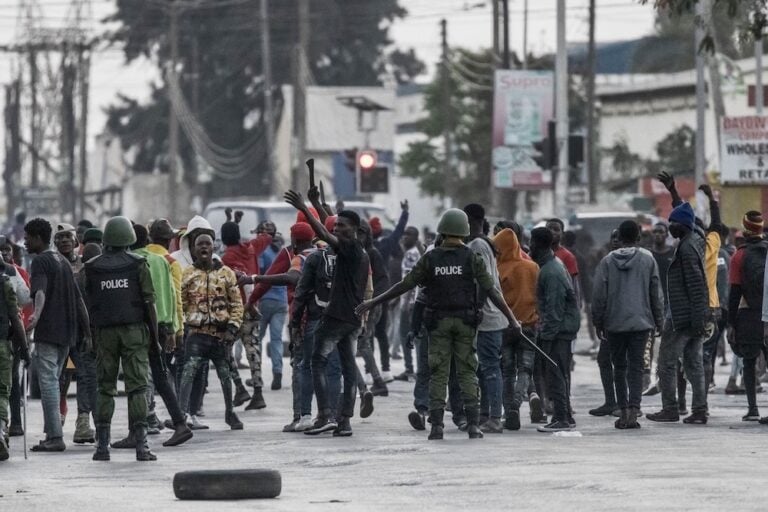**Updates IFEX alerts dated 27, 25, 20, 14, 13, 12, 6, 4, 1 March, 28, 27, 23 February 1996** Several members of the United Nations Human Rights Committee (UNHRC) say the decision by Speaker of the National Assembly Robinson Nabulyato to order the indefinite imprisonment of two newspaper editors was a serious violation of the […]
**Updates IFEX alerts dated 27, 25, 20, 14, 13, 12, 6, 4, 1
March, 28, 27, 23 February 1996**
Several members of the United Nations Human Rights Committee
(UNHRC) say the decision by Speaker of the National Assembly
Robinson Nabulyato to order the indefinite imprisonment of two
newspaper editors was a serious violation of the International
Covenant on Civil and Political Rights (ICCPR) as well as
Zambia’s own laws. At a hearing into Zambia’s human rights record
in New York on 26 and 27 March 1996, the UNHRC noted that the
decision by Nabulyato to jail editor-in-chief of “The Post
newspaper”, Fred M’membe, and managing editor Bright Mwape was
taken without “judicial participation.”
According to a press release issued by the United Nations (UN),
UNHRC expert from France, Christine Chanet, asked how Parliament
could act as both judge and jury in the case of the two editors
as well as freelance columnist Lucy Sichone. David Kretzmer, an
expert from Israel, said it was worrisome that a political body
such as Parliament seemed to have the same powers of the
judiciary, as shown by the sentencing of the journalists to
indefinite imprisonment. Meanwhile, the expert from Mauritius,
Rajsoomer Lallah, said that while Zambian legislation was fully
in accordance with the ICCPR, to which Zambia acceded in 1984,
these laws were not being effectively implemented. Parliament did
not have the power to send people to prison, Lallah stated, and
only a court of law could find someone liable for contempt of
parliament. Zambian law required that M’membe and Mwape should
have been given a fair trial, and the journalists should have had
the right to appeal against the outcome of such a trial. In this
regard, Zambian law was in line with the ICCPR, Lallah said, but
the case of M’membe and Mwape represented a gross violation of
the ICCPR, as the law had not been properly implemented. If
people could not comment on what the parliament did, how could
freedom of expression be ensured? Lallah asked.
In its report to the UNHRC–presented at the beginning of the
hearing–the Zambian government said that it was committed to
promoting democratic principles and was determined that the
country’s constitution should effectively promote fundamental
human rights and freedoms. In presenting the report, Zambian
government envoy Peter Kasanda said that everyone in Zambia had
the right to freedom of expression and to seek, receive and
impart information and ideas, the UN reports. However, Kasanda
said there were limitations to this right to ensure that the
enjoyment of this right did not prejudice the rights of others or
“the public interest.” Kasanda reportedly said that journalists
were very free in Zambia, and that government did not interfere
with their work. But when journalists attacked Parliament, the
reaction was different, the UN reports Kasanda as saying.
Appeals To


